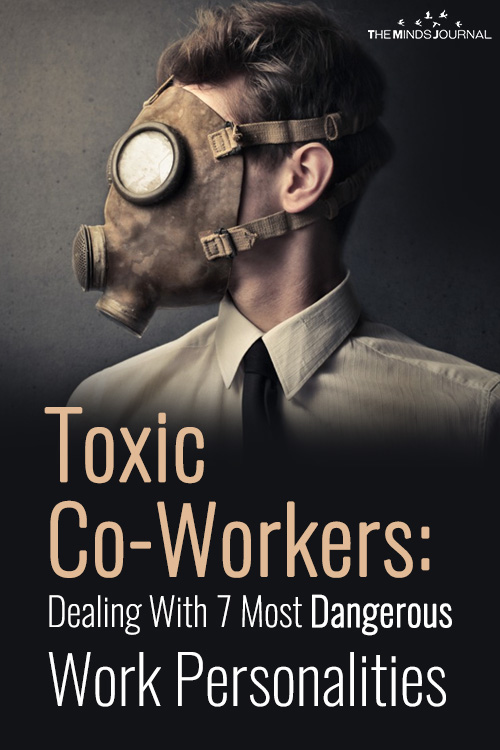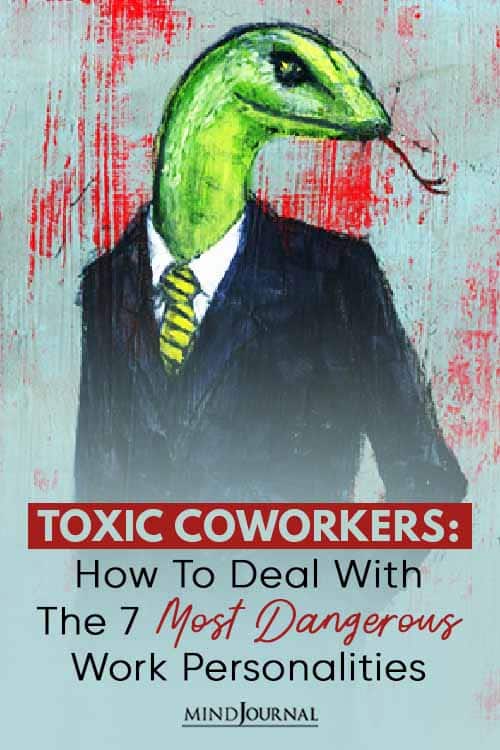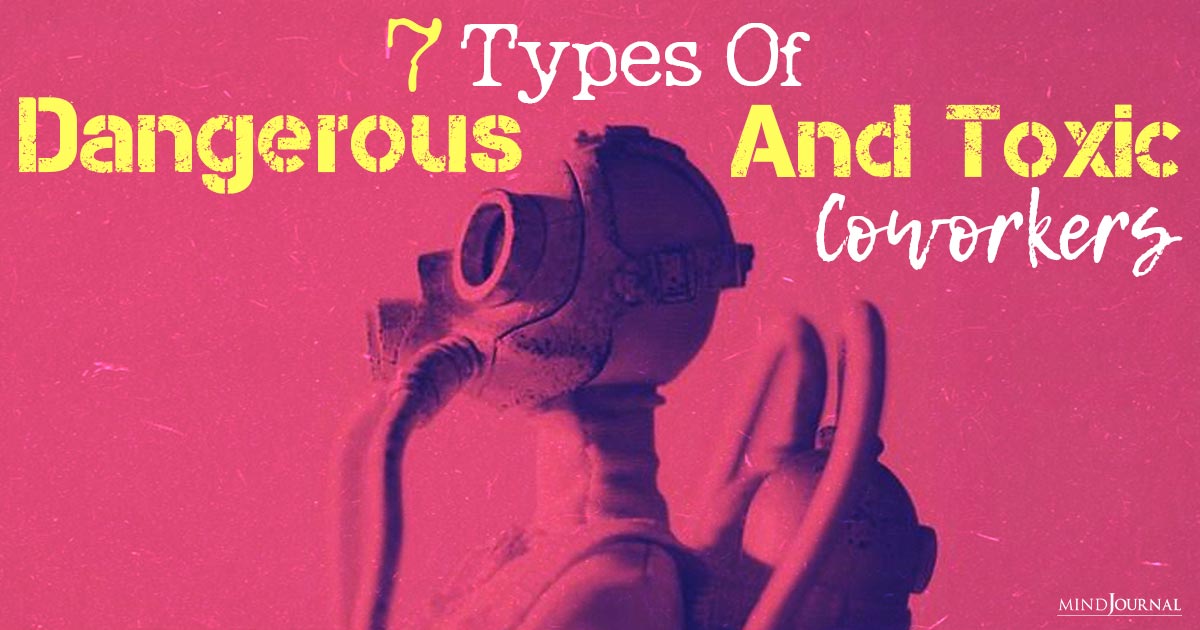The workplace. What a sweet, amazing, beautiful, and evil place to be in. Yes. You read that right. EVIL! And you know it. No. I am not talking about your boss. That dude pays you your salary. He has every right to be as mean and sadistic as he wants. I am talking about those toxic coworkers who can make your work and your workplace either the best place you can be in or make you absolutely hate it.
“Don’t let negative and toxic people rent space in your head. Raise the rent and kick them out.” — Robert Tew
Related: Signs of A Toxic Person At Work: Workplace Bullying and Ways To Stop It
Surviving The Modern Workplace
Politics is a crucial part of our modern work culture, whether we like it or not.
It can be fun at times and even motivate us to work smarter. However, most of the time office politics can be a pain in the ‘you know what’. In this modern corporate culture, we spend innumerable hours at work.
As a result, we spend more time with our lovely and sometimes toxic coworkers than our friends and family. Some of our co-workers can be very helpful and truly amazing which often results in a lifelong friendship outside work.
But most of the time we are stuck with really toxic coworkers which can affect our mental well-being and our work performance. Toxic coworkers can demotivate us and even want us to quit our jobs. We surely don’t need that. We can feel helpless as we can’t really choose who we work with and where someone should be in the hierarchy.
The best thing we can do while dealing with toxic coworkers in the workplace is to minimize the impact they have on us and our work.
Let us take a look at the 7 most dangerous work personalities and some effective strategies on how you can deal with them. Let’s get started.
7 Types Of Dangerous And Toxic Coworkers
1. The One Who Gossips.
You know who I am talking about. These are the ones who spread rumors across departments and the only thing they are good at is talking about other employees behind their backs. They mold and exaggerated the truth and gossip about everything and anything going around the office.
They mostly behave out of their insecurities and try to shift the focus away from their own flaws. This can oftentimes affect your motivation to work and make you worry about issues that may not even exist in reality.
How To Deal With The Gossiper
#Tip 1
When it comes to dealing with toxic people at work, understand that it can be hard to communicate logically and rationally with these types of individuals.
No. You cannot stop them or make them change their personality and behavior.
The best way to communicate with the gossiper is to tell them directly yet politely that you don’t appreciate the exaggerated or untrue comments they make about others. But you need to be careful as this can turn into a whole new gossip for them to spread around.
#Tip 2
Make sure you do not indulge or participate in spreading any rumors or gossip about your boss, co-workers, or about your organization. Do not share any details about your personal and social life with co-workers you barely trust.
#Tip 3
Understand their behavior is a part of their personality.
They mainly act out of their own insecurities and flaws. So do not take their comments or words personally. Focus on controlling your own words and behavior instead of rectifying them. As they say, lead by example.

2. The One Who Blames.
One of the most dangerous types of toxic coworkers right here. These are the employees who shift responsibilities constantly and blames others for not getting the work done. It is easy for them to point fingers at others when things go wrong.
They will never accept their own faults, mistakes, poor decisions and bad performance.
They are also expert liars and can easily convince others that they are right, even when they are not. The blamers are also known as the guilt trippers.
How To Deal With The Blamer
#Tip 1
Admit and accept any mistakes on your end instead of playing their blame game. This will demonstrate that you are a more mature and responsible worker who believes in taking charge instead of pointing fingers at others. Self-development is key here.
#Tip 2
When it comes to coping with toxic coworkers like them, instead of engaging in their blame games, redirect the attention towards verifiable and genuine facts.
#Tip 3
Do not let the blamer push you around and make sure you establish boundaries. Focus on your own safety and show them their limits through careful words and actions.
Related: 7 Tips To Heal After The Cruel Words of A Toxic Person
3. The One Who Is Emotional.
These are the drama queens and drama kings. They tend to be very emotional and react in ways that are not usually considered professional. They may have a histrionic personality disorder or at least behave as they do. They are attention seekers and react dramatically as they can be way too emotional.
They mostly develop superficial relationships to meet their emotional needs. However, they can also be highly magnetic, funny, energetic, and entertaining. So make sure you identify them and maintain your distance.
These kind of toxic coworkers cannot be relied on with tasks and responsibilities as they tend to ‘lose it’ easily.
How To Deal With The Drama Queen/King
#Tip 1
Try not to criticize them even when their faults stick out like a sore thumb. Instead, praise them for what they bring to the table and their positive aspects.
#Tip 2
If necessary, tell them honestly about how their reactions, behavior, and mood swings affect you personally. Make sure you remain calm during their theatrical and emotional episodes.
#Tip 3
Understand that it is not your job to take care of them or change their personality or behavior. Focus on how you can minimize the impact of their behavior on your work.
4. The One Who Controls.
The control freak is one of the most toxic coworkers that can be found in any workplace. They can be highly critical of everyone, especially those who work in their own unique way. They may show signs of OCD (obsessive-compulsive disorder) while at work.
They feel a strong need to control the outcome of whatever is going on around the workplace.
Hence, they often intrude in other people’s business that is not related to their own work and step over boundaries. They can be an asset to the organization, but their perfectionist attitude can demotivate others around them. They will most probably be your supervisor or your manager.
How To Deal With The Control Freak
#Tip 1
Make sure to praise them for their attention to detail and appreciate their contributions to the organization. However, you need to understand that praise and flattery are not the same things.
#Tip 2
It can sometimes be best to let them take over and control the outcome when the task is not that crucial or does not affect your performance adversely.
#Tip 3
Dealing with toxic coworkers like them means you shouldn’t take their behavior or actions personally. Have confidence in your abilities and skills.
Related: 4 Ways To Deal With Toxic Energy Vampires Who Are Stealing Your Positive Vibes
5. The One Who Complains.
They act like the victim in every circumstance and complain about everything just to gain attention. Their constant nagging can seriously affect your performance and demotivate you in the long run.
They often try to convince others in the organization how the management acts unfairly and focus only on what is going wrong. Their negativity can be infectious and can bring down the entire office environment.
How To Deal With The Victim
#Tip 1
Be patient when communicating with them. Understand that they actually feel victimized and are not behaving like this intentionally.
#Tip 2
Focus on the facts to point out the errors in their belief and try to show them the positive side of the organization. When they start complaining, listen to them patiently and then offer a counter-argument with sufficient evidence.
#Tip 3
Whenever possible, empathize with the victim. However, do not fall into the trap of believing what they say. Create boundaries while making conversations, avoid them whenever possible, and stand up for yourself when needed.

6. The One Who Is Paranoid.
You know your paranoid coworker better than anyone else. They are often suspicious of the management and everyone else for that matter. They may show some signs of paranoid personality disorder, even if they don’t actually have it.
They do not trust anyone in the office and can come up with the weirdest conspiracy theories about others and the company. Their behavior can have serious negative effects on your work and performance.
How To Deal With The Paranoid
#Tip 1
Dealing with toxic people at work means you need to be careful about what you tell them about yourself, others, your boss, or the organization. Understand that your harmless words can easily become the next conspiracy theory about getting them fired.
#Tip 2
Provide factual and rational explanations to them about why what they believe is not correct and why it will probably not happen.
#Tip 3
Do not believe their theories or notions as their negative perceptions can affect your own thoughts and behavior.
7. The One Who Is A Narcissist.
The narcissist is perhaps the most dangerous and one of the worst types of toxic coworkers to work with.
They are huge egomaniacs and are mostly work as managers or supervisors or even your boss. They often show the classic signs of narcissistic personality disorder.
They lack empathy for their co-workers, require constant admiration, expect high praise even if it is undeserved and act like they are entitled to everything in the organization. They are annoying, arrogant, and disliked by most people in the office.
They view themselves as exceptional performers, even when they are not. They are undoubtedly toxic for your workplace as they have an inflated view of their own self which can be damaging to others and the company at large.
How To Deal With The Narcissist
#Tip 1
Although flattery is a great way to boost their ego and make peace with them, you can stick to some general praise and appreciation. This will make things easier for you, especially if they are high up in the hierarchy.
#Tip 2
If you must criticize their actions or confront their behavior, make sure you begin by offering positive feedback first and then gently shift towards criticism. This is one of the best things to do when it comes to coping with toxic coworkers.
#Tip 3
Have realistic expectations from the narcissist. Make sure not to get into situations or positions where they can take credit for your work or criticize you.
Related: The Only Working Way To Effectively Deal With A Narcissist In Your Life
The workplace can be a weird yet amazing place you will find yourself in.
It is filled with awe-inspiring individuals with unique skills, talents, and personalities. Chances are you have already encountered one or more of these toxic coworkers and now you know how you can go about dealing with toxic people at work. Simply start with effective communication and maintaining boundaries.
Once you can identify the personality of a co-worker, you will be able to better manage yourself, your work and your professional relationships while safeguarding your well-being and your career.
Have you ever encountered such toxic coworkers at your workplace? Do you have any more ideas about dealing with toxic coworkers? Let us know your thoughts in the comments down below!














Leave a Reply